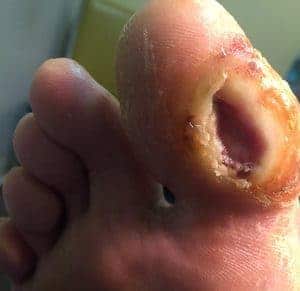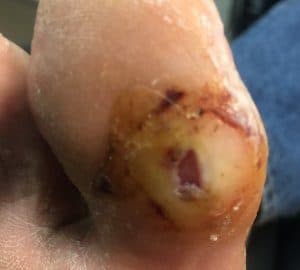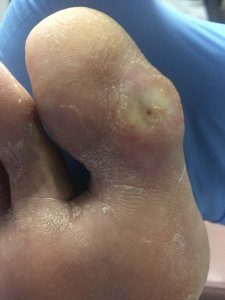
Do open wounds or chronic sores put you at risk for infection?

Thus, Pulsed Acoustic Cellular Expression (PACE) technology was developed. The dermaPACE is the first and only device to utilize specifically designed PACE protocols to treat wounds.
Applications for – chronic sores
The dermaPACE apparatus is approved for the treatment of chronic defects of the skin and subcutaneous soft tissues (tissues under the skin). DermaPACE’s pulsed acoustic waves are effective on acute and post-operative wound including:
- Arterial ulcers
- Decubitus ulcers
- Deep-partial thickness burns
- Diabetic ulcers
- Post-traumatic wounds
- Venous ulcers
What Should I Expect?
Most dermaPACE treatments take place at your Podiatrist’s Office. The appointment is scheduled; an intake appointment may or may have not been completed ahead of time. Regardless, you should expect to answer some basic questions and undergo a physical evaluation prior to the procedure. It is a good idea to wear loose-fitting clothing. You should be in general good health at the time of the appointment. You will be asked to sign an informed consent form prior to the treatment.
How To Prevent Chronic Sores?
Chronic sores can be really annoying especially when you are a diabetic patient and you really don’t want to suffer from them again in the future.
Therefore you must try some preventive tips so that the sores stay miles away from you!
Here are some of the best preventive tips to avoid chronic sores in the future:
- Quit Smoking Forever
Yes, even if you love smoking you must leave it for sake of a healthy life.
Smoking doesn’t increase the chances of sores but if you develop one and keep smoking then you may face many complications.
Smoking and tobacco restricts your veins from circulating blood through your blood, this can causes low blood pressure, can increase chances of injection and slow downs body’s healing process!
Which means if you develop a sore then it may turn into a non-healing injury and it can be a really dangerous condition.
- Inspect Your Body For Sores Daily
This may not sound like a good idea or may not sound really effective but it’s not the truth.
If you develop any sores you may not know about it, especially if you are a diabetic person.
However, if you inspect your body daily then you can notice the sores and treat them right away.
This will prevent further complications and give you a healthy life.
- Stay Safe From Hazards
There are some dangers that can cause you chronic sores and you should stay away from them, these hazards can include:
- Sharp objects
- Hot water
- Too cold water
- Fire
- Harsh sunlight
- Bacteria and germs
You should stay away from these things.
Sometimes there some unexpected dangers may appear, even if they damage you, calm down and get the treatment right away.
Delaying the treatment can put you at a risk of infection or amputation.
What are the differences between acute and chronic wounds?
Acute wounds and chronic wounds differ in several key aspects, including their causes, healing processes, and characteristics:
- Causes:
– Acute wounds are typically caused by trauma, such as cuts, burns, or surgical incisions.
– Chronic wounds are often the result of underlying health conditions, such as diabetes, venous insufficiency, or arterial disease, and may also be caused by pressure or repetitive trauma (e.g., pressure ulcers or diabetic foot ulcers).
- Healing Process:
– Acute wounds generally follow a predictable healing process, with distinct phases (hemostasis, inflammation, proliferation, and remodeling) that lead to complete healing within a few weeks.
– Chronic wounds are characterized by a stalled or impaired healing process, often due to underlying factors that interfere with normal wound healing mechanisms. This can result in wounds that do not heal or heal very slowly over an extended period.
- Characteristics:
– Acute wounds are typically well-defined, with clean edges and minimal surrounding tissue damage.
– Chronic wounds may have irregular edges, and the surrounding skin may be discolored, swollen, or thickened. They may also have a persistent presence of bacteria or biofilm.
- Risk Factors:
– Acute wounds are often the result of isolated incidents and are not necessarily associated with specific risk factors (other than trauma).
– Chronic wounds are more likely to occur in individuals with certain risk factors, such as diabetes, vascular disease, or immobility, which can impair the healing process.
Can chronic sores and wounds lead to other health problems?
Yes, chronic sores and wounds can lead to other health problems if left untreated or if healing is delayed. Some potential complications of chronic wounds include:
- Infection: Chronic wounds are more susceptible to bacterial infections, which can lead to cellulitis (skin infection), osteomyelitis (bone infection), or systemic infections (sepsis).
- Delayed Healing: Chronic wounds can impair the body’s ability to heal properly, leading to prolonged pain, discomfort, and impaired mobility.


